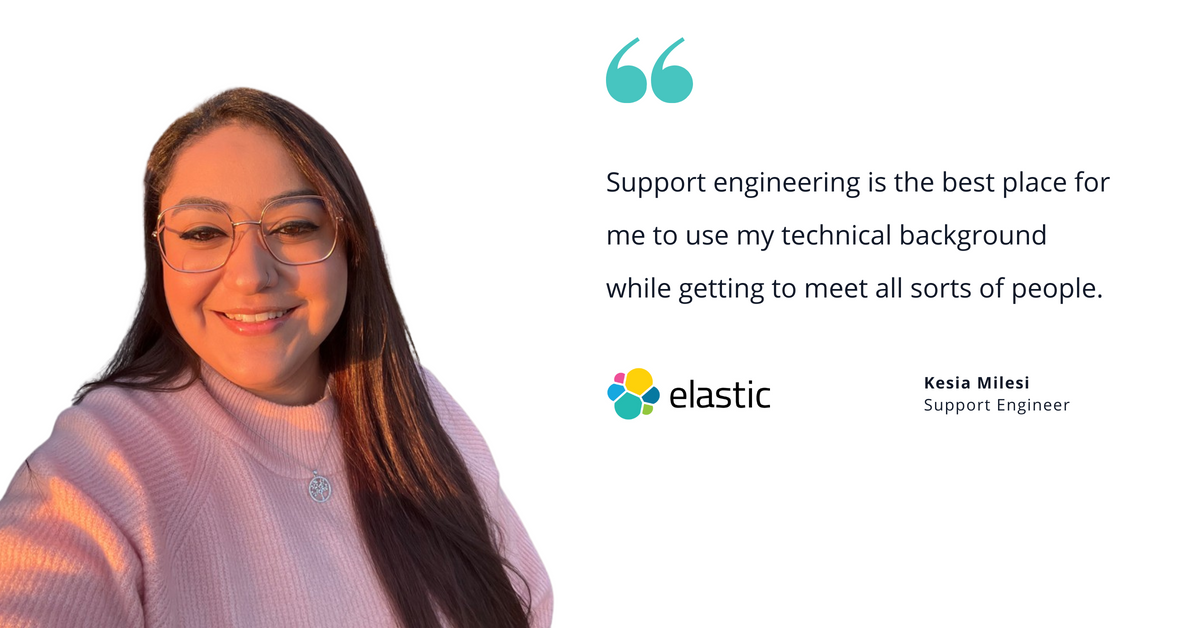Kesia Milesi likes to joke that she was dragged into support engineering.
“In college, I didn’t even know support was an option. I thought I would end up working at a help desk or as a developer in a company,” Kesia shares. “My first exposure to support was actually as a trainee with IBM. They allocated me to this thing called ‘support’ and had me start debugging files.”
Despite her hesitancy at the jump, that trainee experience opened Kesia’s eyes to a new realm of possibilities — one that aligned perfectly with both her social disposition and love of solving problems. Fast forward 10 years, and Kesia is now thriving as a full-time support engineer with Elastic, the leading platform for search-powered solutions with a robust support department.
“I might have fallen into this field, but I wouldn’t change it for anything,” she says. “Support is the best place for me to use my technical background while getting to meet all sorts of people.”
We sat down with Kesia to learn more about the road that led to support engineering, along with four questions to ask yourself before diving into the field.
Fighting fires & finding solutions
Kesia has always had a naturally social demeanor. Even while getting her undergraduate degree in computer science, she simultaneously worked as an English teacher.
“I’ve been teaching and showing people how to do things for years,” she shares. “When I left IBM, I went to a startup and that was my first contact with Elasticsearch. With some practice, I realized I knew enough not only to teach the customers and help the customers fix their problems and create documentation, but also to teach other people in the company to do it well.”
Across a series of different technical roles, Kesia started to understand more of the customers’ pain points, use cases, and goals. It became second nature to ask the right questions, listen, and then help find a solution.
“At that point, I decided to try my hand at being a business analyst. But I soon found that was not for me,” Kesia laughs. “I missed the energy and the adrenaline of having everything on fire and having to engage with the right people to solve the problem. It was then that I knew I wanted to deal with customers, get to know their business, and also put out their fires.”
Cue, Elastic.
A place to grow
Kesia was instantly convinced when she came across Elastic’s associate support engineer opening.
“I saw the description was very technical, so I knew it was exactly what I was looking for,” she recalls. “But what really impressed me was that I was interviewed by women in both phases of the recruitment process. It warmed my heart knowing other women were working in technical roles.”
Kesia could envision herself building a long career inside Elastic with relatable role models and an inclusive company culture. She was thrilled when Elastic extended an offer — and hasn’t looked back since.
Is support engineering right for you?
For Kesia, support engineering ended up being the perfect marriage for her technical background and friendly demeanor. She views these as the foundation of a successful career in support.
Even more, she encourages anyone interested in assisting customers with technical challenges to ask themselves these four questions:
- Do you like to solve problems? “We are like firefighters. So it’s important to consider that you’ll be dealing with people and they won’t be happy all the time. They will come to you with big issues that they’re unable to resolve themselves.”
- Are you good at explaining concepts? “Support engineers are very technical people, but we also have to have empathy for the person on the other side. We need to know how to meet them where they’re at and walk them through a solution.”
- Do you enjoy learning? “You will be learning all the time on the job, and a lot of time, you’re learning by yourself. When you’re making an investigation to find the root cause of an issue, you have to do your own research. We’re diggers for documentation. We have to search for what other people before us did to solve a similar issue.”
- Are you comfortable asking for help? “I’ll admit that this was hard for me at the beginning of my career because I was afraid of being judged. But we don’t know everything. We might study a lot, but there’s still more to learn. So we have to ask for help. Don’t be ashamed — everyone has to begin somewhere.”
If you’ve checked all the boxes, Kesia has one final piece of advice for you.
“Just go for it! Don’t think too much. At the beginning of my career, people would roll their eyes when they heard about support engineering, but I realized that you can build a great career in this. The options are truly unlimited. In Elastic, there are so many opportunities to improve yourself as a professional and grow. I wouldn’t want to be anywhere else.”
Ready to build your career in support engineering or another technical field? Elastic is hiring! Check out the career opportunities here.



